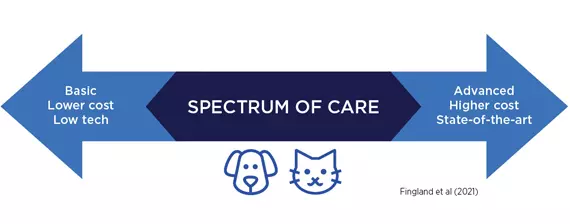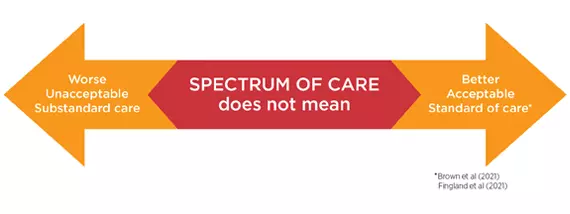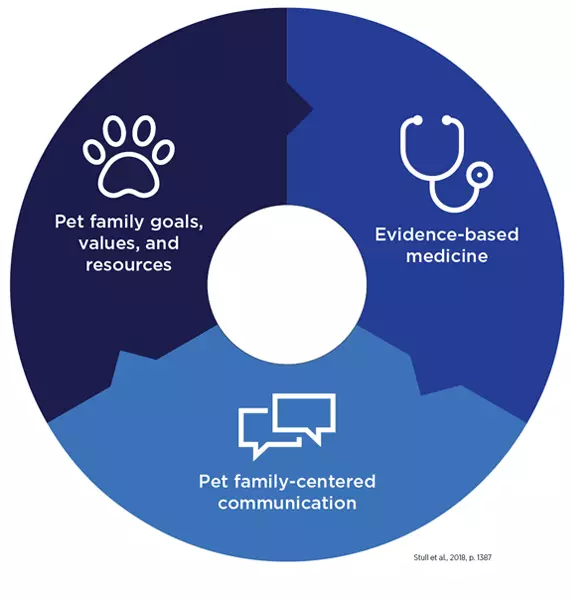No two pet owners or families are the same. They come from diverse backgrounds, have different resources, and share unique bonds with their pets. But they all have one thing in common: they love their pets.
Veterinary healthcare teams see these differences every day, and yet, most have been taught to preferentially present the most advanced, “gold standard” treatment, no matter the family’s situation. But what happens if a family cannot or does not wish to pursue that recommendation? What if they want other options?
When Nationwide conducted a 2019 survey of U.S. pet owners, we found proof that when it comes to recommended treatments, one size doesn’t fit all.
The “gold standard” of care that vets learn in school may clash with what pet owners truly want for their pets
It’s simple: pet owners want options. Rather than viewing that as a barrier to providing optimal care, we think it is a great opportunity. When veterinary healthcare teams begin by incorporating the wishes, resources, and needs of each owner and family, frustration is reduced, trust deepens, and more pets efficiently get the care they need.
This promise of opportunity has driven Nationwide to uncover more about the needs of pet families. What we found is that a spectrum of care approach can be key in providing more care to more pets.
Defining a spectrum of care

A spectrum of care approach combines evidence-based medicine with pet family emotional, physical, and financial resources, then communicates a range of options to pet families without judgment.
Find Nationwide’s own research analysis results on petinsurance.com/petdata.
One thing to keep in mind: basic does not mean bad.
In some cases, it may mean offering options that address a pet’s comfort, rather than seeking a cure.

Meet Sunny
6-year-old female Golden Retriever
Diagnosed with torn cranial cruciate ligament (CCL)
Examples of spectrum of care treatment options: Basic: Pain medication, outpatient crate rest, and physical therapy Intermediate: Extracapsular surgical stabilizations (e.g. lateral suture technique)
Advanced: Treatment with a board-certified veterinary surgeon (e.g. Tibial Plateau Leveling Osteotomy (TPLO) or Tibial Tuberosity Advancement (TTA)
It is important to recognize that basic veterinary care does not mean poor animal welfare.
How do we embrace Spectrum of Care?

It starts with pet family-centered communication.
Pet owners sometimes have a hard time talking about the challenges they face in providing care for their pets. Likewise, veterinary healthcare teams face hurdles in understanding the often-unspoken needs of their clients.
To help encourage open conversations between pet owners and veterinary healthcare teams – in the clinic and beyond – Nationwide has partnered with Mind Genomics Advisors on an evidence-based project that will break down communication barriers so more pets can receive increased access to care.
We are looking forward to continuing to spearhead a spectrum of care approach as part of our commitment to pioneering positive change in veterinary healthcare. Since issuing the first U.S. pet health insurance policy 40 years ago, Nationwide has provided a range of pet protection solutions to help more pets receive more care. Now with more than 1 million pets actively insured,, Nationwide has the expertise in pet health and understanding of our members’ needs to advocate for a range of care options through a spectrum of care.
Take the next step today
To learn more about Nationwide® spectrum of care programs and materials as they launch, sign up here.
Resources
Resources to help you learn more about applying the spectrum of care in veterinary practice.
Video:
- “A Spectrum of Care Approach: Why It Makes Sense for Veterinary Healthcare Teams”
Vet2Vet conversation between host Dr. Cassi and Dr. Emily Tincher (March 2023)
Podcasts:
- “Evidence-Based Medicine, Access to Care and Pet-Family Centered Communication”
Episode #179, The Cone of Shame podcast hosted by Dr. Andy Roark and featuring Dr. Emily Tincher - “Your Next Exam Room Superpower: Harnessing the Skill of Clinical Empathy”
Episode #209, The Cone of Shame podcast hosted by Dr. Andy Roark and featuring Dr. Emily Tincher - “How a Spectrum of Care Approach Can Improve Team Efficiency”
Episode #218, The Cone of Shame podcast hosted by Dr. Andy Roark and featuring Dr. Emily Tincher
Articles:
- “More Care for More Pets”
by Dr. Emily Tincher, Today’s Veterinary Business, April/May 2023 - “Unspoken Needs: Using Behavioral Science to Drive a Spectrum of Care”
by Dr. Emily Tincher, Today’s Veterinary Practice, July/Aug. 2023 - “What do pet families want? (And how do we communicate it?)”
by Dr. Kate Boatright, AAHA NEWStat, February 2023